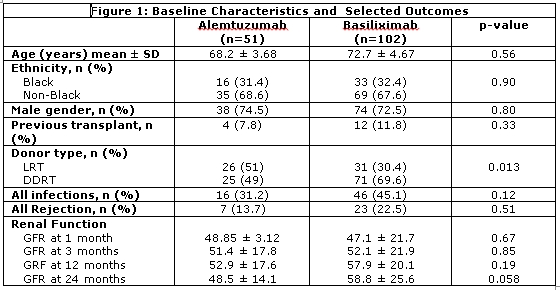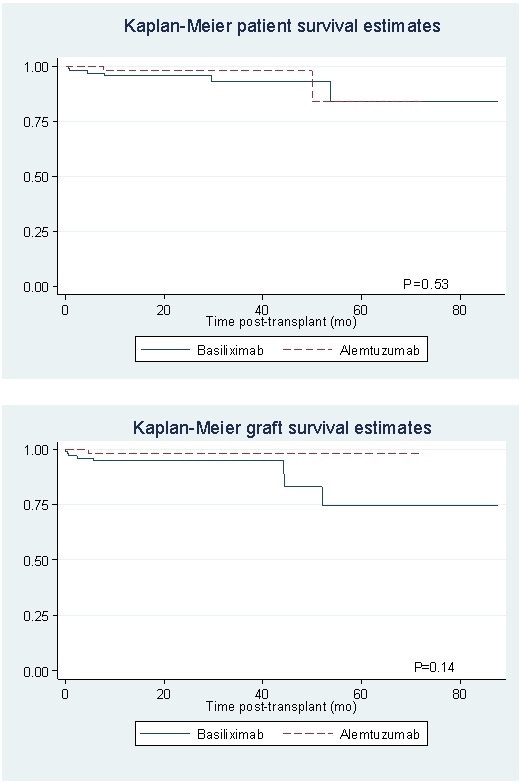Alemtuzumab Induction Therapy in Elderly Kidney Transplant Recipients.
1Pharmacy, University of Maryland Medical Center, Baltimore
2University of Maryland Medical Center, Baltimore.
Meeting: 2016 American Transplant Congress
Abstract number: C38
Keywords: Elderly patients, Induction therapy, Kidney transplantation
Session Information
Session Name: Poster Session C: Clinical Science - Kidney Immunosuppression: Induction Therapy
Session Type: Poster Session
Date: Monday, June 13, 2016
Session Time: 6:00pm-7:00pm
 Presentation Time: 6:00pm-7:00pm
Presentation Time: 6:00pm-7:00pm
Location: Halls C&D
Background: In descriptive studies, alemtuzumab has been associated with an escalating risk of death and graft loss in elderly (≥65 years) kidney transplant recipients. However, this has not been explored in a larger population with a comparator arm. The purpose of this study was to compare the safety and efficacy of alemtuzumab with basiliximab induction in this population.
Methods: This was a retrospective cohort study of kidney transplant recipients ≥65 years old. Patients who received alemtuzumab induction were matched in a 1:2 fashion to the basiliximab control group. Exclusion criteria included multi-organ transplant recipients and patients enrolled in a study protocol. Maintenance immunosuppression consisted of tacrolimus, mycophenolate mofetil and steroids in the majority of patients. The outcomes of interest include patient and graft survival, rate of rejection and infection.
Results: Patient and transplant characteristics are summarized in Figure 1. Post-transplant infections were similar between groups (p=0.08). There was no difference in rates of rejection and infection (p=0.51, p=0.12, respectively). Patient and graft survival rates were also similar (p=0.53, p= 0.14, respectively); with no difference in graft function at any time point during follow-up (p=NS). 

Conclusions: Alemtuzumab does not confer additional risk in select elderly renal transplant recipients. Immunologic and infectious risk should be considered when choosing appropriate induction.
CITATION INFORMATION: Yakubu I, Masters B, Ravichandran B, Sparkes T, Moss M, Rasetto F, Jonchhe S, Thomas B, Costa N, Leeser D, Bartlett S, Haririan A. Alemtuzumab Induction Therapy in Elderly Kidney Transplant Recipients. Am J Transplant. 2016;16 (suppl 3).
To cite this abstract in AMA style:
Yakubu I, Masters B, Ravichandran B, Sparkes T, Moss M, Rasetto F, Jonchhe S, Thomas B, Costa N, Leeser D, Bartlett S, Haririan A. Alemtuzumab Induction Therapy in Elderly Kidney Transplant Recipients. [abstract]. Am J Transplant. 2016; 16 (suppl 3). https://atcmeetingabstracts.com/abstract/alemtuzumab-induction-therapy-in-elderly-kidney-transplant-recipients/. Accessed July 6, 2025.« Back to 2016 American Transplant Congress
